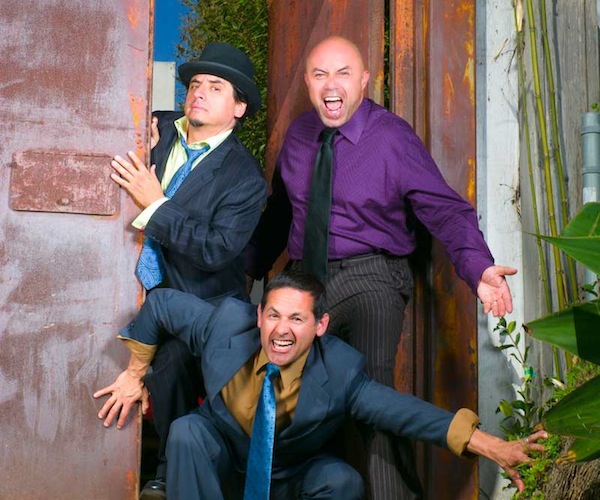Theater Review: Culture Clash at 30 — Still Making Ballsy Political Theater
Culture Clash’s view of America will discomfort, which is all the more reason that I urge you — strongly — to attend.
Culture Clash 30th Anniversary Tour: Muse & Morros. Created, written, and performed by Richard Montoya, Ric Salinas, and Herbert Siguenza. Presented by ArtsEmerson, Jackie Liebergott Black Box Theatre at the Paramount, 559 Washington Street, Boston, MA, through March 29.

Ric Salinas, Herbert Siguenza, and Richard Montoya from Culture Clash. Photo: Eric Schwabel
By Robert Israel
It has taken ten years for Culture Clash, a Los Angeles, California-based Chicano/Latino performance troupe, to return to Boston. It’s easy to understand why: they performed here courtesy of the Huntington Theatre Company, and their brand of audacious, politically-charged themes made many theatergoers squirm. And while many today will find the current production just as discomforting, that’s all the more reason to urge you — strongly — to attend.
Culture Clash is firmly rooted in an era of activist art that, even in its heyday thirty years ago when the troupe was founded, teetered on a precipice. Thanks to its members’ grit and tenacity (Ric Salinas, Herbert Siguenza, and Richard Montoya) the troupe has survived and prospers. Culture Clash emerged at a time in our history (the nation was still reeling from the trauma of the Vietnam War) when a number of political theater companies felt free to critique American society. These groups offered bold plays that captured the voices of the dispossessed, disabled veterans, immigrants, men and women of color, the impoverished, farm laborers, and others who had been left behind and ignored, shut out of the good life. Two of these California-born troupes –- the Provisional Theatre of Los Angeles and the Snake Theatre of Sausalito — have gone the way of the wooly mammoth. The San Francisco Mime Troupe, founded during this era, performs throughout California and maintains an active presence in the Bay Area. What has also vanished – or is on life support because of a lack of arts funding – is the loose network of alternative theaters (some based at colleges or universities) that used to sponsor these troupes (subsidizing travel expenses, and room and board for the actors) on national tours.
Muse and Morros is a high acceleration non-stop one-act show where you hear from an uncanny congregation of marginalized voices. There’s a Latino transsexual healthcare worker who shares intimate details about her surgically re-designed pudenda; a Bible-thumping priest who counters the American image of a WASP Christ with his vision of the true nature of Jesus’ Middle Eastern ethnicity; a whacked-out potty-mouthed Asian gang-banger attired in bling and sunglasses who refers to his homeboys as “niggers”; a Pakistani taxi cab driver in Washington, D.C. who has trouble differentiating prostitutes from the U.S. Congressmen who ride in his cab. In short, we hear disparate, ribald stories from the great unwashed about the landed gentry: their stories are compelling, hilarious, vulgar, and heartbreaking.
The set, perfectly suited to Emerson’s Black Box theatre, is minimalist, with an oversized American flag that serves as a scrim against one wall. The only other prop is a street lamp, off to stage right. The audience is seated as if at a fashion runway, and this is by design: the actors are adorned with garish costumes plucked, no doubt, from the bins in Salvation Army thrift stores. When the performers make their entrances, they sashay down this dark runway, breaking into obscene dances, jumping up and down on the balls of their feet, and, true to the the company’s name, clashing with each another. The message comes across loud and clear: the great American melting pot is a lumpy stew at best. More than once the actors lament our collective inability to co-exist amiably. More than once we hear racial epithets, crass guttural sounds that have become widely accepted and mimicked in popular entertainment. This coarse language stings, lacerates, scars. Thanks to generous amounts of humor, we laugh at what we hear; otherwise, we’d be reduced to tears, or, worse, rise up in fury.
ArtsEmerson is to be congratulated for inviting this ballsy troupe to Boston. Near the end of Muse and Morros, we hear from a survivor of a sordid chapter in our city’s history: the molestation of Catholic altar boys, a scandal covered up by Boston’s Archdiocese. This personal testimony was drawn from an interview conducted by the actors (as is all the other material in the show); it hits home the hardest because we are still living with the collective memory of that hideous stain, which has yet to fade away.
Culture Clash sees America through a glass darkly — there are only brief flickers of light. It is a disturbing view of the homeland that is necessary to confront because it shows us just how far we are from creating a united republic that is equitable for all.
Robert Israel writes about theater, travel and the arts, and is a member of Independent Reviewers of New England (IRNE). He can be reached at risrael_97@yahoo.com
Tagged: Arts Emerson, Culture Clash, Herbert Siguenza, Ric Salinas
